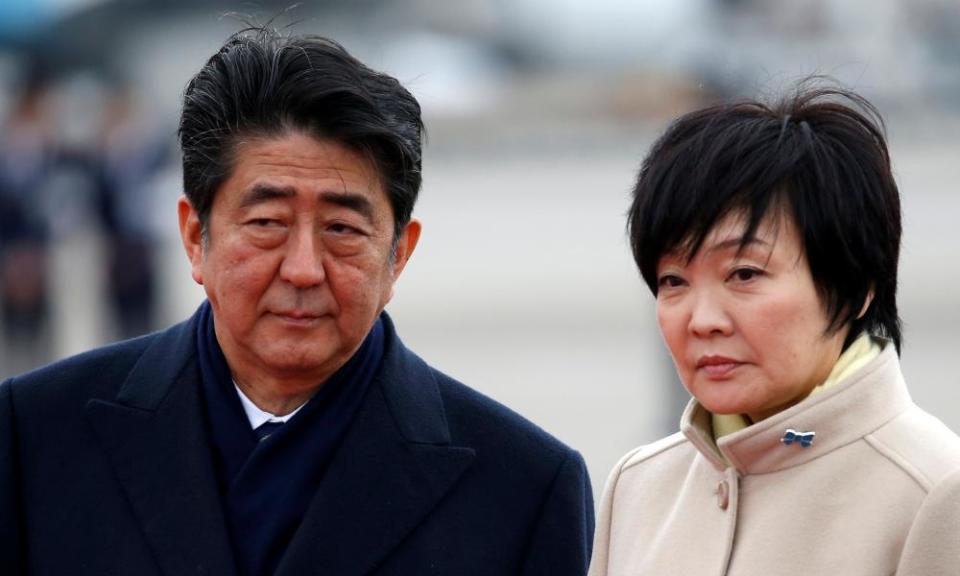Ultra-nationalist school linked to Japanese PM accused of hate speech

Parents of former pupils of an ultra-nationalist Japanese kindergarten at the centre of a political scandal have asked authorities to investigate its operator over claims of hate speech toward ethnic minorities and the borderline abuse of children.
The parents have asked the prefectural government in Osaka, where Moritomo Gakuen kindergarten is based, to look into claims that it “often does things to the children that verge on abuse, and uses discriminatory language toward Chinese people and others in its newsletters”, Kyodo news reported on Wednesday.
The nature of the alleged abuse was not immediately clear.
The private kindergarten has attracted daily media coverage in recent weeks over a land deal and its relationship with the prime minister, Shinzo Abe, his wife and prominent politicians who support its conservative education ethos.
The kindergarten’s plans to open a sister primary school in Osaka next month attracted criticism following revelations that the operator had bought public land for the facility at a fraction of its listed price.
Moritomo Gakuen paid ¥134m (£950,000) for the 8,770 square metre plot, 14% of its appraisal price.
Abe has offered to resign if any evidence emerges of his involvement in the land deal. His wife, Akie, recently stood down as honorary principal of the school following criticism of her support for Moritomo’s curriculum.
The opening of the primary school, called Mizuho no Kuni or “land of rice”, has been cancelled, and Moritomo is expected to have to return tens of millions of yen in government subsidies.
Moritomo’s curriculum is designed to instil patriotism in its pupils, who are required to bow before portraits of members of the imperial family and go on field trips to military bases. They sing the national anthem every morning and memorise the 1890 imperial rescript on education, which demands loyalty to the emperor and sacrifice for one’s country. The US occupation authorities banned the rescript, believing it had fuelled prewar militarism.
Video footage from 2015 shows Akie Abe telling parents her husband “thinks that education policy here is excellent”. In other clips, children aged three to five are shown shouting their support for the prime minister and urging his government to protect Japan from Chinese aggression.

Osaka officials questioned Moritomo’s principal, Yasunori Kagoike, last month after the kindergarten sent a newsletter to parents that denigrated Chinese people and Korean residents in Japan. The company later apologised.
Parents of former pupils said they had previously voiced their concerns about the kindergarten to officials in Osaka’s private school division, but no action had been taken. “We can’t allow it to get away with anything just because it’s a private school,” Kyodo quoted a parents’ representative as saying.
The kindergarten’s adherence to a prewar rightwing ideology has horrified liberal commentators and generated unusually confrontational exchanges in parliament.
On Tuesday, the defence minister, Tomomi Inada, was forced to retract an earlier statement in which she said she had never given legal advice to Moritomo or represented it in court. In fact, records show she represented it in a civil case in 2004.
Inada, a former lawyer, told parliament she had not lied to MPs in her previous statement, but had suffered a memory lapse.
The scandal has also dented public confidence in Abe’s government. According to a Kyodo poll last weekend, support for his cabinet slumped to 55.7%, down six points from the previous month. A poll by the Nikkei business newspaper showed an even more dramatic drop in support for Abe, to 36.1% from 63.7 the previous week.
Abe and Kagoike, who has indicated he will resign as principal, both belong to Nippon Kaigi, an ultra-conservative lobby group whose members include more than a dozen cabinet ministers.
The group wants to rebuild the military. It claims that Japan “liberated” east Asia from western colonialism during the war, and that the US-authored postwar constitution has emasculated the country’s “true, original characteristics”.
Kagoike had agreed to hold a press conference at the Foreign Correspondents’ Club of Japan in Tokyo on Wednesday, but postponed just hours before it was due to take place.

 Yahoo News
Yahoo News 
